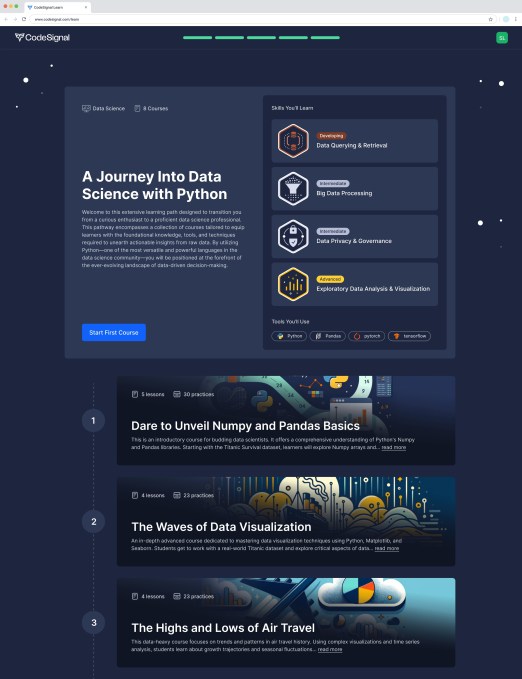Technical assessment company CodeSignal, which counts Index Ventures and Menlo Ventures as backers, is launching a learning platform called CodeSignal Learn. The new platform, aimed at audiences wanting to learn technical subjects, also has an AI-powered bot called Cosmo, which helps users with learning.
The company said that there are hundreds of courses available at launch ranging from introduction to programming, tutorials on specific languages, data analytics and machine learning. Eventually, CodeSignal wants to expand into some non-technical areas — such as management skills — that accelerate career paths.
How does the platform work?
CodeSignal Learn is currently accepting users through a waitlist. Once you get in, the Cosmo bot asks you questions like what you want to learn and what is your skill level. Based on that, it forms a course path for you.

Image Credits: CodeSignal
The platform has two tiers, and the company has chosen a gamified path to monetize its product. With the free tier, you can go through lessons on your own. But as soon as you ask a question to the Cosmo bot, or ask it to help you with an evaluation of your code, you lose one energy bar. Free users get five energy bars with a bar recharging every four hours. This whole process has a mobile game-like feel to it.
If you don’t want to go through any of this hassle, you can pay up to $24.99 per month and get unlimited energy.
Users can learn about different subjects through text or convert the lessons into a slideshow or video-styled presentation. The company said that it has created courses with subject matter experts to put emphasis on practice-first learning, so the courses usually have 90% of content that requires users to work with an integrated development environment (IDE).
Why CodeSignal is developing a learning platform?
The company was originally named CodeFight when it was founded in 2014 as a competitive coding platform. But as it evolved, the startup focused more on technical assessment and rebranded as CodeSignal in 2018.
CodeSignal CEO Tigran Sloyan told TechCrunch over a call that the co-founders started the company with a mission to discover skilled workers and develop the skills that will shape the future. Sloyan said that the startup wanted to do it all and make an educational product as well.
“We quickly realized that focus is everything. So we thought we had to fix assessments first as they are fundamental for both hiring and development,” he said. With the new platform, the company is targeting the idea of skill development for people again.
“We felt that until we figured out a great one-on-one tutoring product we couldn’t have a revolutionary educational product. But with the rise in AI-based tech, we felt this is the right moment,” Sloyan said.
While the company thinks that the learning platform can upskill a wide audience, CodeSignal thought about its customers and how it could work on closing the skill gap for their workers or folks they want to hire.
Competition and the road ahead
Multiple companies are competing in the market of both technical assessments and skill building. Microsoft-owned LinkedIn has both learning and assessment modules. Last year, it launched an AI-powered assistant for learning. Pluralsight, which Sloyan feels is CodeSignal’s biggest competitor, also has an assessment product. In the learning space, there are a ton of competitors such as Coursera and Udemy, along with more focused ones like Guild and Articulate.
Sloyan thinks that CodeSignal has an edge because it has a practice-first approach to learning. Plus, he believes that the Cosmo AI bot is akin to having a private tutor by your side.
The company is also launching CodeSignal for teams and beta testing the enterprise products, which will offer a more customized version to large organizations. The CEO expects that the learning product will generate 50% of the company’s revenue in two years.
CodeSignal raised its last investment with a Series C raise of $50 million in 2021. While the startup is not profitable yet, it is not looking to raise another round anytime soon. The company has raised $87.5 million to date. The company employs 200 people, almost three times more than the 70 people it had on payroll in 2021.
